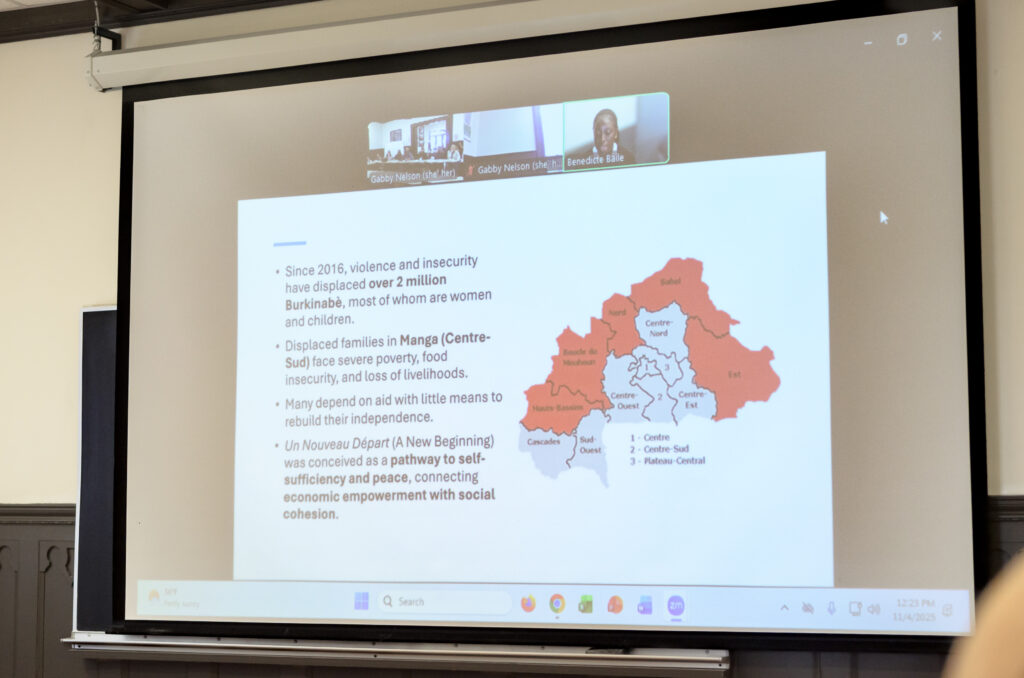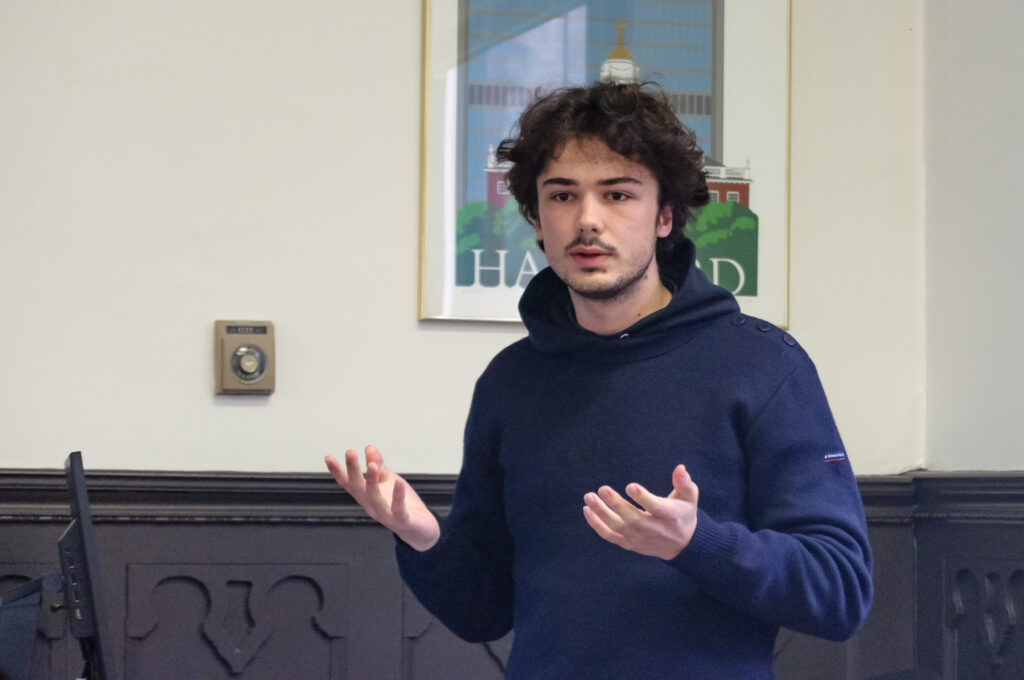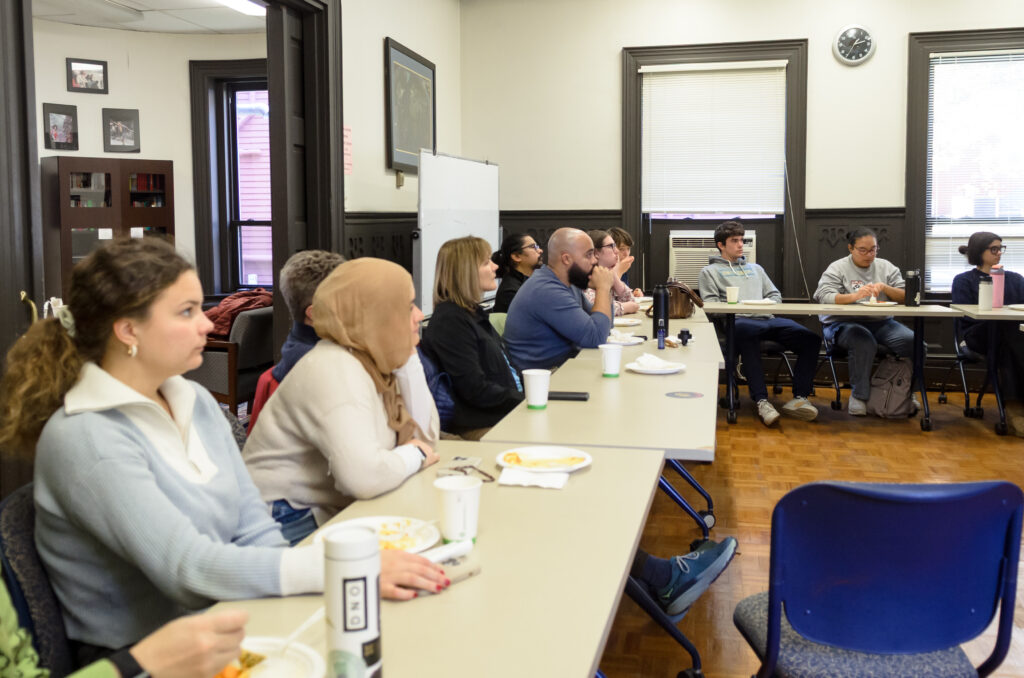Student ‘Projects for Peace’ Grant Recipients Share Their Global Experiences
Two Trinity College students who were awarded Projects for Peace grants for summer 2025 recently shared with Trinity students, faculty, and staff updates about their global outreach endeavors.

Projects for Peace is a global program that encourages students to develop innovative, community-centered, and scalable responses to the world’s most pressing issues. Benedicte Baile ’25 and Alexander Cacciato ’26 each received a $10,000 grant to implement projects to promote their visions of peace over the summer. They delivered presentations about their completed projects on November 4 at Trinity’s Center for Urban and Global Studies (CUGS) at 70 Vernon Street.
Baile, a computer science major who graduated in May, returned to her home country of Burkina Faso to undertake a community-driven agricultural initiative to help refugee families establish a financial footing in a project titled “Un Noveau Depart (A New Beginning)”. The program worked with Teel-Taaba, a local NGO in the Zoundweogo Province of Burkina Faso. The goal of the program is to provide a pathway to self-sufficiency for displaced families. “In the end, this project is indirectly benefitting around 150 people because many of the workers have families that they provide for,” said Baile.
“Eighty percent of the population is actually employed through agriculture,” said Baile, who delivered her presentation remotely. Despite the large percentage of the population of Burkina Faso being employed via agriculture, many people do not necessarily know how to create sustainable practices, she said. “It was very important to have someone teach them the best way that they could go about producing crops in order to avoid damaging the soil that they were using,” said Baile.

Another factor in her project was making sure the markets for the agriculture products would be able to support their work. Baile said, “The point is to make money off the production of crops in order for them to sustain themselves if they decide that they want to open a business, mainly so they can have a source of revenue in the end.”
Baile said that she discovered a great deal while completing the project. “I learned that empowering people to do things on their own is much better than actually doing it for them,” Baile said. “This project did teach me a lot about what peace actually means to me because peace is not just the absence of war. It is the presence of stability, opportunity, and dignity for people.”
In his presentation, history and international studies: global studies double major Cacciato discussed his project, “Next Generation Talk,” in which he promoted youth civic engagement in Senegal. The project partnered with Guédiawaye Hip Hop, which is an organization that promotes youth civic engagement in Senegal using hip-hop and the urban arts. Cacciato specifically focused on organizing six conferences that served as dialogue spaces where the values and ideas of democratic institutions were brought to local youth in four localities of Senegal’s capital city of Dakar.

Cacciato was particularly interested in encouraging peace for the youth in Dakar. “There is an emphasis on seniority in Senegal,” said Cacciato. His project was aimed at connecting those who hold the power of seniority with the youth, in order to promote civic engagement and collaborate to strengthen civic institutions.
In order to connect his target demographics, Cacciato and Guédiawaye Hip Hop would collaborate with an organization in Dakar to identify panelists who had connections to the specific locality they were reaching. There were several methods of communication used at the conferences, including panel discussions, roundtables, walks with the community, and town hall-style discussions with local municipal leaders.
Cacciato wrote in his report about the project, “I previously defined peace this way: Peace emerges from successful engagement across difference; when diverse communities can stably coexist while maintaining their distinct identities and lifestyles. Democracy exemplifies this vision: it requires different groups to build coalitions to address collective challenges. Democratic engagement is thus paramount for achieving peace.”

He now adds to his previous definition. “I believe this definition of peace still holds, but I would like to amend it slightly to better reflect the specificities of our project and our target demographic: youth,” Cacciato said in his presentation. “We’re really hoping that these organizations are going to continue growing and bringing people into their aegis.”
Gabby Nelson, associate director of CUGS, oversees the Projects for Peace awardees at Trinity in collaboration with Mark Hughes, associate director of grants and fellowships. She said that she finds that Projects for Peace helps to connect students with the world outside of Trinity’s campus.
“A large number of students who do Projects for Peace at Trinity are international students who are conducting projects in their home communities. For them, Projects for Peace is a way to take the opportunities they’re given at Trinity, and take what they’re learning at Trinity, and bring them back to their home community,” she said.
Awarding approximately 125 grants each year, Projects for Peace was created in 2007 through the generosity of Kathryn W. Davis and is now hosted at Middlebury College. Learn more about Projects for Peace here.
